
EITHER NEITHER NOR grammar ELT English Pinterest Learning english, English and Learning
Either you tell him the truth, or I will. According to traditional convention, you should only use either/or with two options, because the word either implies "one of two elements.". As a result, many dictionaries dictate that it would be incorrect to say, "My sister is either at school or at home or at dance.".
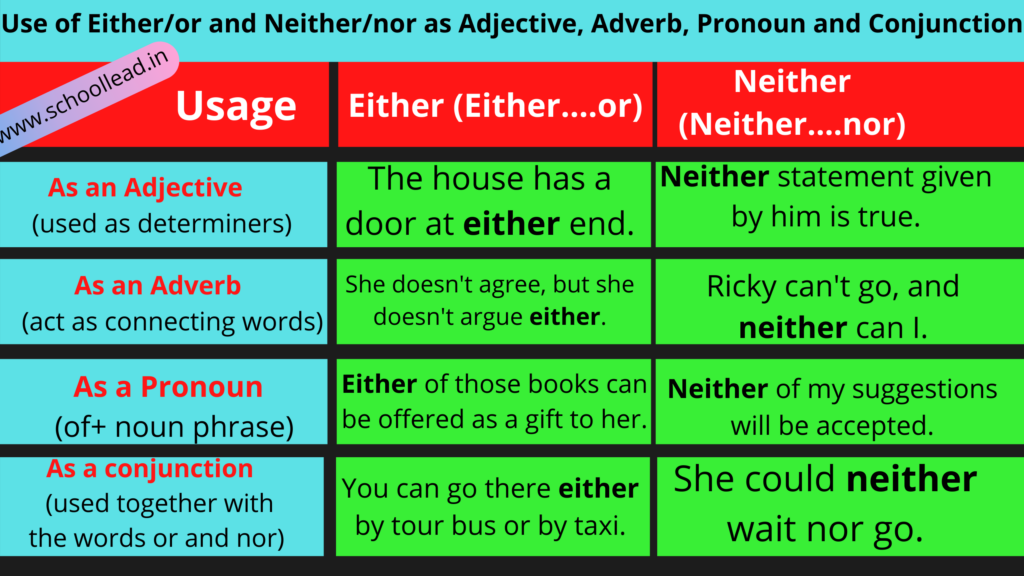
Use of Either…….Or and Neither…..Nor School Lead
The main difference between "Either Or" and "Neither Nor" is the type of choice they express. "Either Or" expresses a positive choice, while "Neither Nor" expresses a negative choice. Here is an example: Either you can come with me to the party, or you can stay at home. Neither John nor Peter will come to the party tonight.

Using Either or and Neither nor in English English Grammar Rules, English Speaking
Remember, " n either" and " n or" are used with n egative statements, while "either" and "or" are their positive counterparts. "Neither" and "either" are usually used before a noun or noun phrase or in place of a noun themselves, while "nor" and "or" are always placed between two nouns or statements. If you need.

Either Or Neither Nor
The correlative conjunctions either.or and neither.nor co-ordinate two or more words, phrases or clauses.. Note that the constructions following these correlatives should be parallel in structure. That is, they should have the same structure: if a noun is used after one, then a noun must follow the other; if a prepositional phrase is used after one, then a prepositional phrase must.

Either Or Neither Nor English Grammar, English Language, Learning English, Esl
Cassie doesn't play either soccer or baseball. 2. The expression neither . . . nor means not the first one and not the second one. Examples: Neither the bank nor the credit union will give you a loan. Mrs. Chavez grows neither onions nor garlic in her garden. I am neither going to work nor attending my classes today. Directions: Combine the.
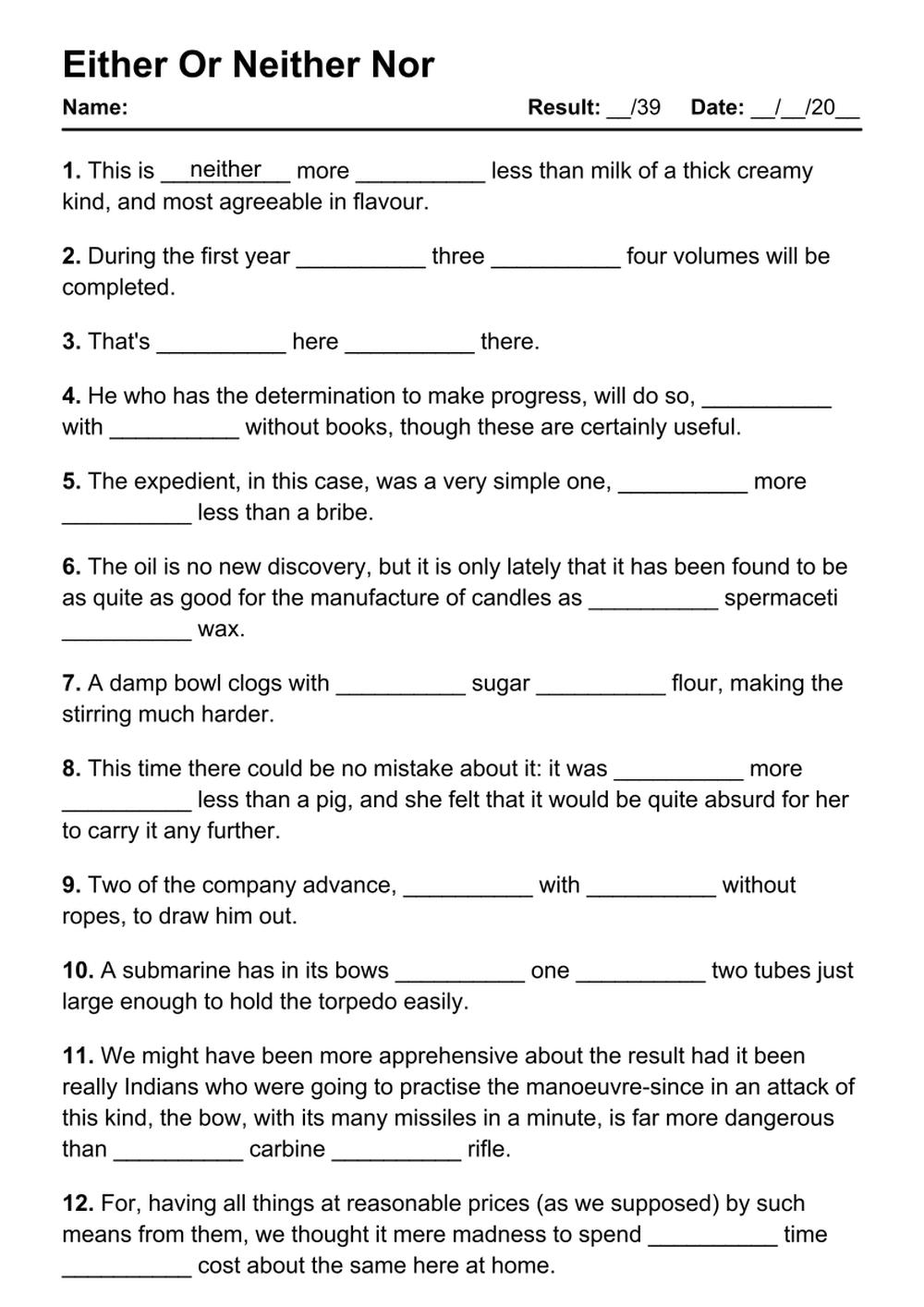
11 Printable Either Or Neither Nor PDF Worksheets Grammarism
Here are common ways "Neither…nor" is used: 1. Presenting Negative Conditions: "Neither [Option 1] nor [Option 2].". Example: "Neither the cat nor the dog is allowed on the couch.". Meaning: Both the cat and the dog are not allowed on the couch. 2. Excluding Multiple Options:

NEITHER, EITHER, NOR, SO English ESL worksheets pdf & doc
For example: "Neither Mr Smith nor Mrs Jones came to the meeting.". Pro tip: When using either/or and neither/nor use a singular verb in the sentence if both the subjects (nouns) are singular, for example, "either my mother or my father is coming". "Is" is the singular verb in this sentence. But, if either of the subjects is plural.
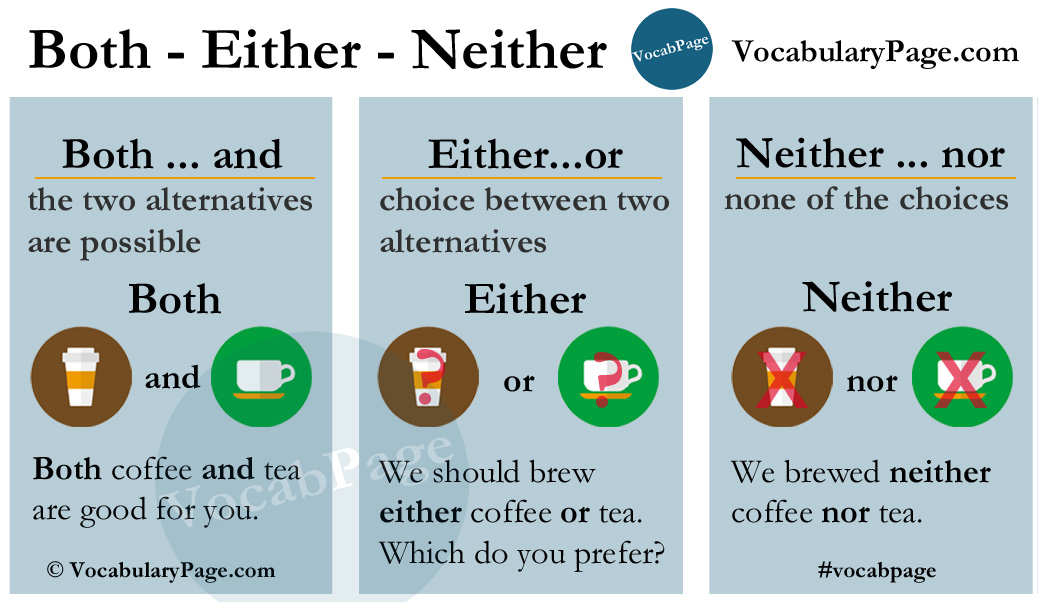
How to use either/or and neither/nor
Either coffee or tea is fine. We could use either blue paint or red paint. She will buy either some apples or some oranges. We can also use 'neither + noun + nor + noun'. This tells us about two negative ideas, but it's quite formal. It's more normal just to use 'not + or'. I don't like coffee or tea. I like neither coffee nor tea.

Either Or And Neither Nor How to Use them Correctly? • 7ESL
Neither, neither. nor and not. either - English Grammar Today - a reference to written and spoken English grammar and usage - Cambridge Dictionary
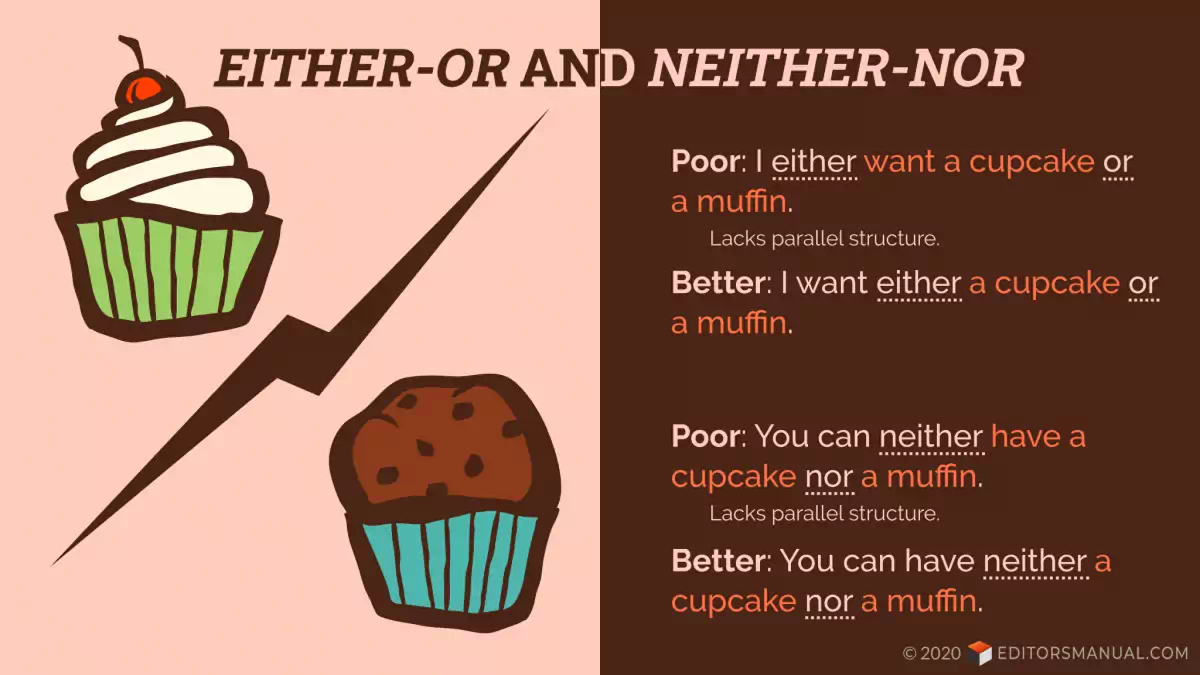
EitherOr, NeitherNor The Editor’s Manual
either/or - They are used together to offer a choice between two things. > You can either call me at home or at the office. > Either mum or dad will come to pick you up. neither/nor - When they're paired up they negate both parts of a statement. > Neither the blue one nor the red is available in size 4.
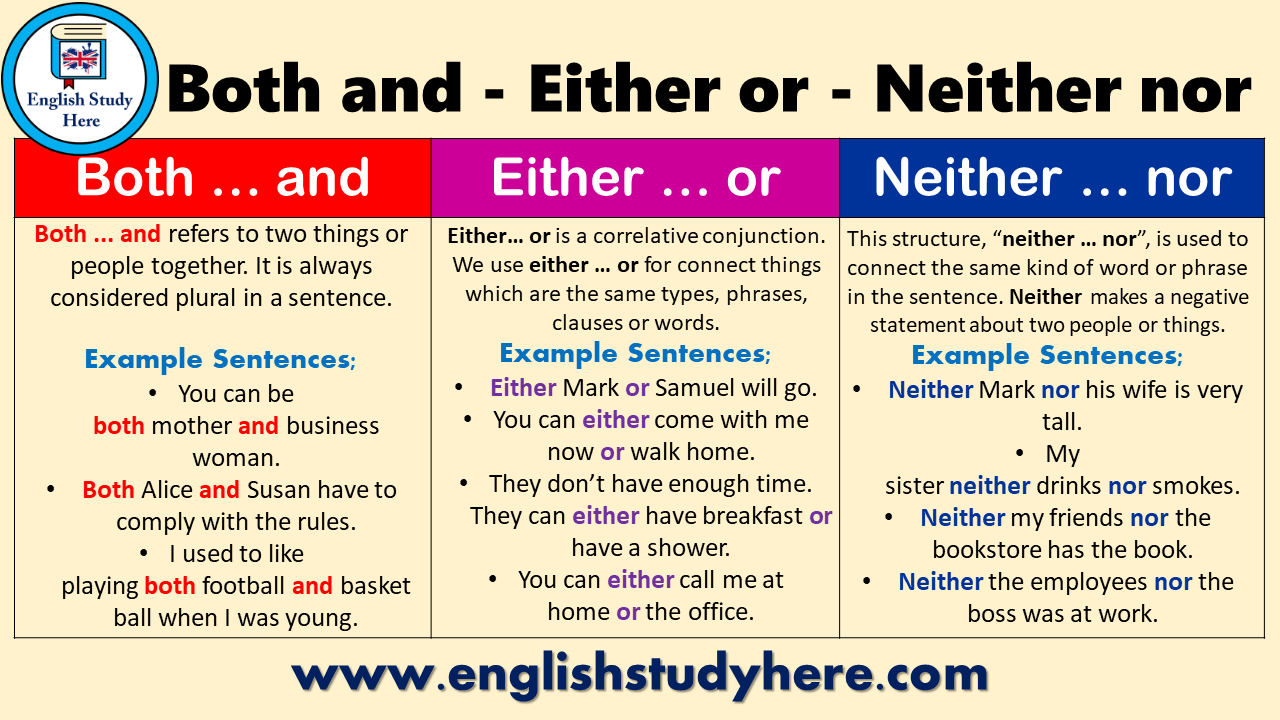
Using Both and, Either or, Neither nor English Study Here
Here are some quick rules of thumb to remember about "either. or" and "neither. nor": The word either should never be paired with. The word neither should never be paired with. You can only use nor in a sentence if there's a neither (Some people say that "not. nor" is also a valid construction, but it's safer to stick.
Using 'neither nor' and 'either or' Going back to the basics Netscribes
Either-or and neither-nor constructions must be parallel in structure: the two parts joined by or or nor should be grammatically balanced. Examples. Incorrect: Lulu either wants a hat or an umbrella for her birthday. Lacks parallel structure: either is followed by a verb, while or is followed by a noun phrase. Correct:
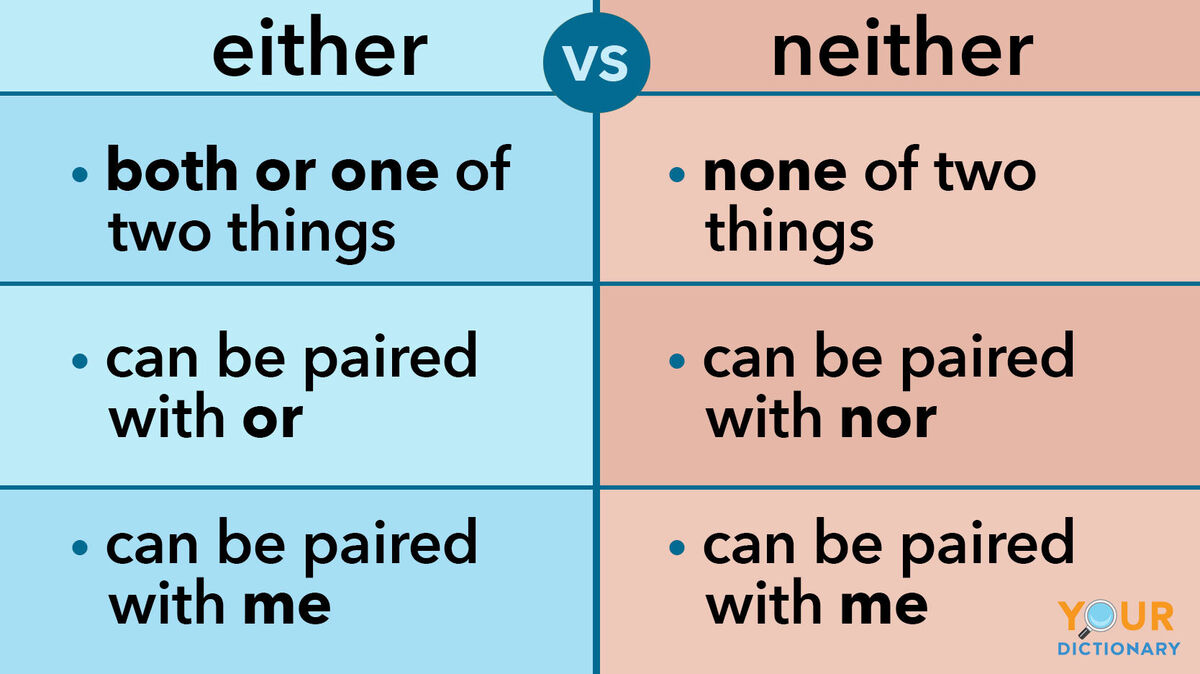
Either or Neither? Simple Tips on How to Use Each Word YourDictionary
1. I don't like either Stephen or Peter. OR I like neither Stephen nor Peter. 2. He either keeps the keys himself or leaves them with his wife. 3. He neither came nor called. 4. He wasn't wearing either a shirt or a coat. 5. He will neither come here nor send a representative. 6. Either he or his wife may attend the function. 7.
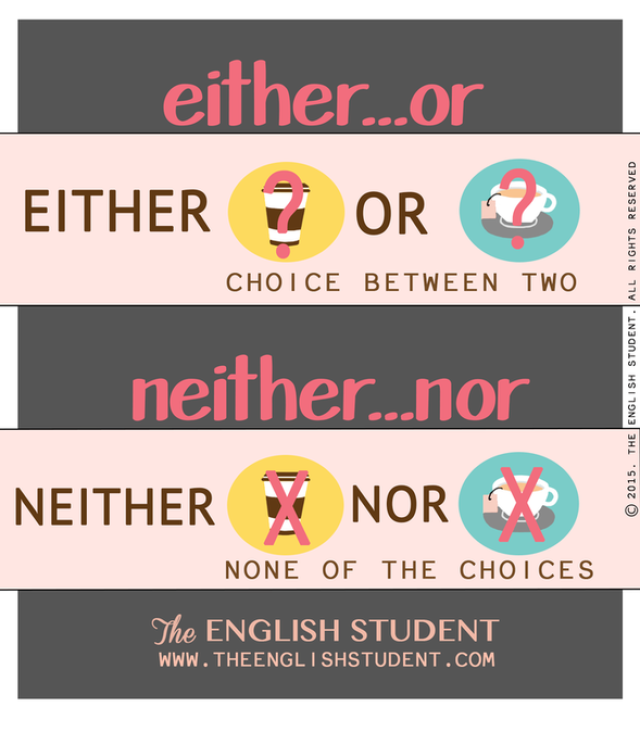
'Either...or' and 'neither...nor' · English grammar exercise (intermediate level) bitgab
Either/or and neither/nor. 1. Either / or - used in a sentence in the affirmative sense when referring to a choice between two possibilities. We can either eat now or after the show - it's up to you. 2. Neither / nor - used in a sentence in the negative sense when you want to say that two or more things are not true.
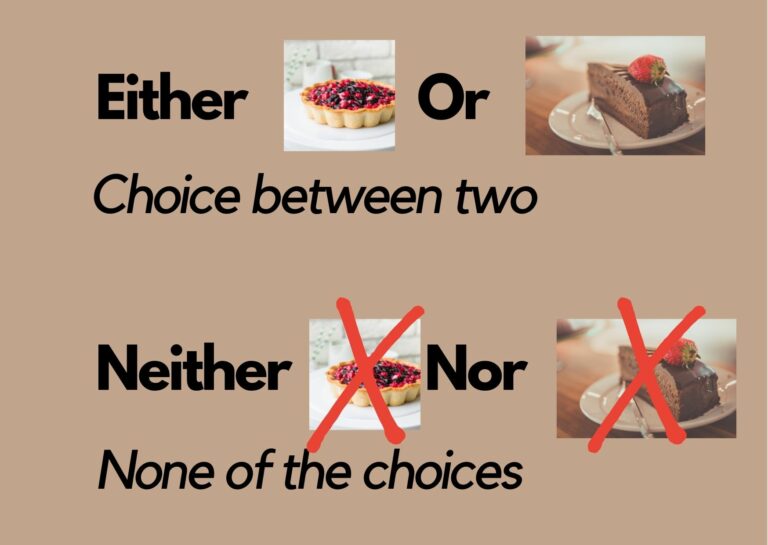
Neither Nor & Either Or Explanation and Examples BusinessWritingBlog
The words either , neither , either or, and neither nor are used frequently but sometimes incorrectly. You might find it baffling to decide when to use either and when to use neither when writing a thought. Basically, either has a positive connotation, while neither implies a negative statement. Both are used to present choices or alternatives.

Either Or Neither Nor Examples slideshare
Rule 3. The verb in an or, either/or, or neither/nor sentence agrees with the noun or pronoun closest to it.. Examples: Neither the plates nor the serving bowl goes on that shelf. Neither the serving bowl nor the plates go on that shelf.. This rule can lead to bumps in the road. For example, if I is one of two (or more) subjects, it could lead to this odd sentence: